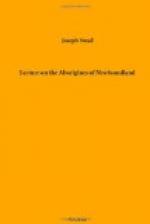two men were different, the latter remained unshaken
in his determination, and with a cheerful countenance,
and air of perfect confidence in the good faith of
his new allies, he motioned to them with his hands
to proceed, disregarding his companion and seeming
to treat with scorn Mr. Buchan’s invitation
to depart freely if he chose to do so. Soon afterwards
the party reached their rendezvouz—slept
there one night, loaded themselves with the presents
and returned again towards their Wigwams. The
behaviour of the Indian remained the same—he
continued to show a generous confidence, and the whole
tenor of his conduct was such as Mr. Buchan could
not witness without a feeling of esteem for him.
On arriving at the wigwams they were found deserted,
which threw the Indian into great alarm. Many
circumstances determined Mr. Buchan to let him be
at perfect liberty, and this treatment revived his
spirits. The party spent the night at the Wigwams,
and continued their route in the morning. They
had proceeded about a mile, when, being a little in
advance of the rest, the Indian was seen to start suddenly
backwards; he screamed loudly and then fled swiftly,
which rendered pursuit in vain. The cause of
flight was understood when Mr. Buchan the next moment,
beheld upon the ice, headless and pierced by the arrows
of the Indians, the naked bodies of his two marines.
An alarm had, it is evident, been given by the savage
who deserted the party at the rendezvouz, and it is
supposed that to justify his conduct in so deserting,
he had abused his countrymen with a tale which had
excited them to what they perhaps considered a just
retaliation. Thus ended an enterprise which was
conducted with an ability, zeal, perseverance and
manly endurance of extreme hardship, which merited
a better success.—When the spring became
sufficiently advanced Mr. Buchan returned with his
vessel to St. John’s, and at once sought and
obtained permission from the Governor to return in
the summer, in the hope that as the natives came in
that season down the rivers to fish and hunt, he might
the more easily fall in with them. In this expectation,
however, he was disappointed, as he only succeeded
in merely discovering some recent traces of them.
Captain Buchan, still sanguine of success, requested
permission to winter in St. John’s, that he
may be in readiness to take the earliest of the ensuing
spring to go in quest of them again. This was
acceded to; but of the movements of Captain Buchan,
in consequence of this arrangement, there is no record,
it is only known that no additional discoveries were
made—but from the facts ascertained by Captain
Buchan in his first excursion, the authorities felt
satisfied the number of the Indians had been greatly
underrated. Captain Buchan was of opinion they
could not be less (in the whole) than three hundred
persons. Now this is an important fact, as it
goes far to disprove the generally received opinion
that the tribe is extinct, inasmuch as that opinion
was formed from the representations of the decreased
numbers of her tribe, made by the Indian woman taken
in 1823, but the accuracy of the whole statement there
is much reason to doubt. In the course of this
narrative we shall be brought to the details of her
statement, when a closer comparison of the conflicting
accounts can be made.




